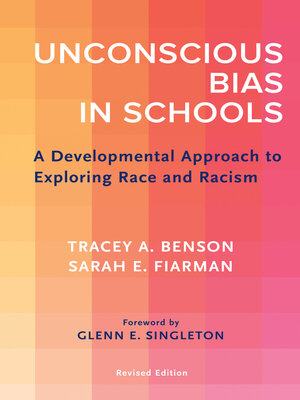Unconscious Bias in Schools
ebook ∣ A Developmental Approach to Exploring Race and Racism, Revised Edition
By Tracey A. Benson

Sign up to save your library
With an OverDrive account, you can save your favorite libraries for at-a-glance information about availability. Find out more about OverDrive accounts.
Find this title in Libby, the library reading app by OverDrive.



Search for a digital library with this title
Title found at these libraries:
| Library Name | Distance |
|---|---|
| Loading... |
In Unconscious Bias in Schools, two seasoned educators describe the phenomenon of unconscious racial bias and how it negatively affects the work of educators and students in schools. "Regardless of the amount of effort, time, and resources education leaders put into improving the academic achievement of students of color," the authors write, "if unconscious racial bias is overlooked, improvement efforts may never achieve their highest potential." In order to address this bias, the authors argue, educators must first be aware of the racialized context in which we live.
Through personal anecdotes and real-life scenarios, Unconscious Bias in Schools provides education leaders with an essential roadmap for addressing these issues directly. The authors draw on the literature on change management, leadership, critical race theory, and racial identity development, as well as the growing research on unconscious bias in a variety of fields, to provide guidance for creating the conditions necessary to do this work—awareness, trust, and a "learner's stance." Benson and Fiarman also outline specific steps toward normalizing conversations about race; reducing the influence of bias on decision-making; building empathic relationships; and developing a system of accountability.
All too often, conversations about race become mired in questions of attitude or intention–"But I'm not a racist!" This book shows how information about unconscious bias can help shift conversations among educators to a more productive, collegial approach that has the potential to disrupt the patterns of perception that perpetuate racism and institutional injustice.
Tracey A. Benson is an assistant professor of educational leadership at the University of North Carolina at Charlotte. Sarah E. Fiarman is the director of leadership development for EL Education, and a former public school teacher, principal, and lecturer at Harvard Graduate School of Education.
Through personal anecdotes and real-life scenarios, Unconscious Bias in Schools provides education leaders with an essential roadmap for addressing these issues directly. The authors draw on the literature on change management, leadership, critical race theory, and racial identity development, as well as the growing research on unconscious bias in a variety of fields, to provide guidance for creating the conditions necessary to do this work—awareness, trust, and a "learner's stance." Benson and Fiarman also outline specific steps toward normalizing conversations about race; reducing the influence of bias on decision-making; building empathic relationships; and developing a system of accountability.
All too often, conversations about race become mired in questions of attitude or intention–"But I'm not a racist!" This book shows how information about unconscious bias can help shift conversations among educators to a more productive, collegial approach that has the potential to disrupt the patterns of perception that perpetuate racism and institutional injustice.
Tracey A. Benson is an assistant professor of educational leadership at the University of North Carolina at Charlotte. Sarah E. Fiarman is the director of leadership development for EL Education, and a former public school teacher, principal, and lecturer at Harvard Graduate School of Education.







